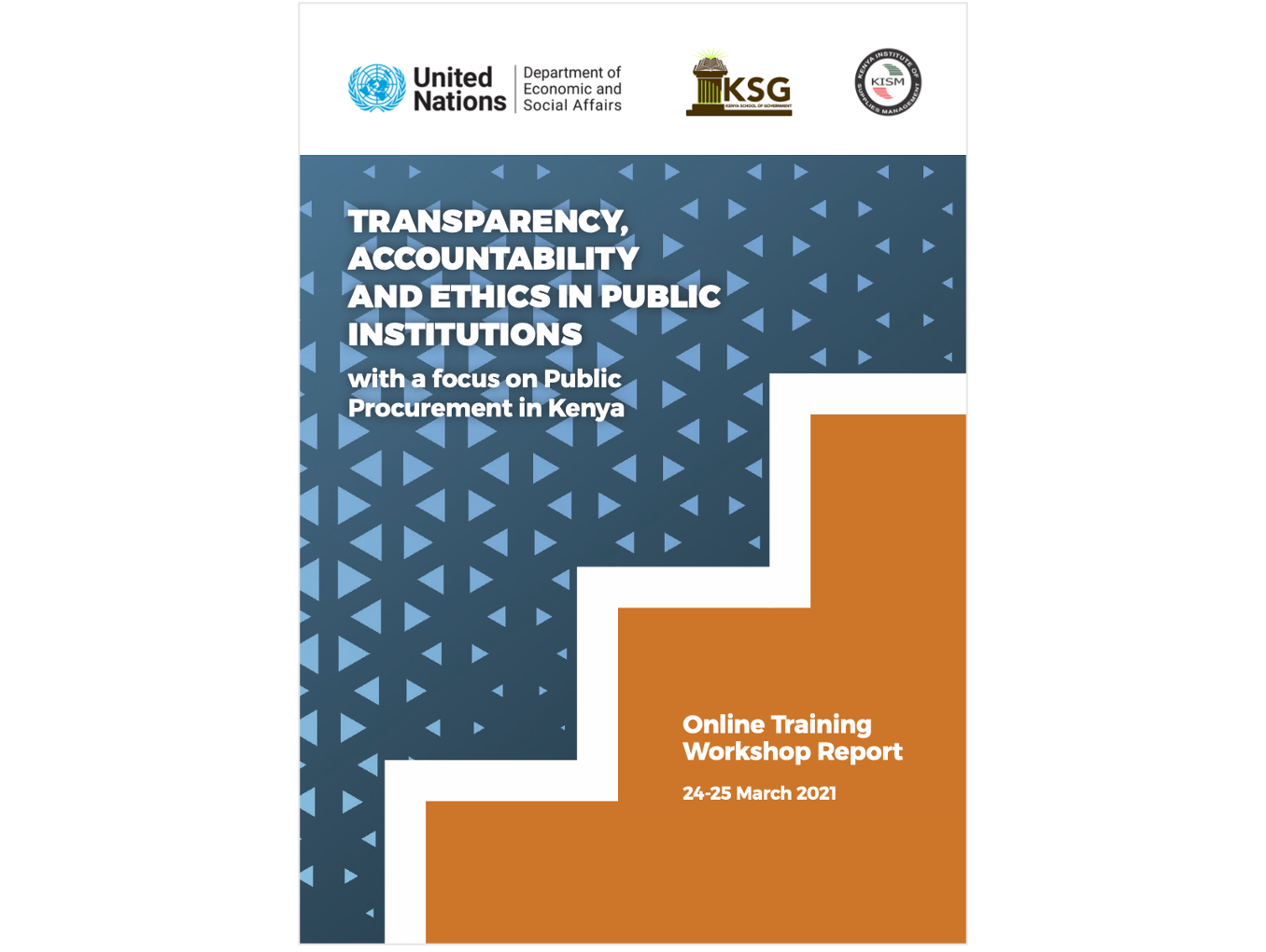The United Nations Department of Economic and Social Affairs (UNDESA), together with the Kenya School of Government (KSG) and the Kenya Institute of Supplies Management (KISM), co-organized an online training workshop on Transparency, Accountability and Ethics in Public Institutions with a focus on Public Procurement in Kenya. The two-day virtual workshop was held on the 24th and 25th of March 2021, with each session running for two hours (9:00 AM – 11:00 AM (New York time) / 4:00 pm – 6:00 pm (East Africa time)). More than 50 public procurement professionals and specialists from Ministries, Departments, Agencies and training institutions in Kenya attended the sessions.
The workshop piloted two modules from the Transparency, Accountability and Ethics in Public Institutions toolkit (henceforth referred to as “the Toolkit”)1: One on “Essentials of ethics and public integrity” and another one on “Transparent public procurement”. At the same time, the workshop aimed at increasing knowledge and developing the capacity of procurement professionals to address related issues in their functions to avoid slowing down the achievement of the Sustainable Development Goals (SDGs) and implementation of the key principles of the 2030 Agenda for Sustainable Development such as Leave No One Behind.
Mr. Stephen Jackson, UN Resident Coordinator in Kenya, and Professor Ludeki Chweya, Director-General of the KSG, opened the workshop, stressing that transparency in public procurement is vital to ending corruption, building confidence in government, efficiency in public service delivery and delivering the SDGs. UNDESA staff presented toolkit material on the topics “Essentials of ethics and public integrity” (Day 1) and “Transparent public procurement” (Day 2) and facilitated two interactive exercises completed by participants in breakout rooms – first, a visioning exercise on how a world without corruption would look and second, a discussion of a fictitious ethical dilemma regarding emergency public procurement in a hospital during the COVID-19 pandemic.
In addition to these inputs based on the toolkit, the workshop was enriched by interventions from a number of expert speakers. More specifically, the themes of the two workshop days focused on the following:
Day 1 provided participants with an overview of the importance of fighting corruption for achieving the SDGs, the 11 Principles of Effective Governance for Sustainable Development, the United Nations Convention Against Corruption, integrity challenges faced by public servants, dealing with ethical dilemmas, rules-based and values-based approaches to in- integrity management in public institutions, the role of the UN Ethics Office as an example managing ethical risks (e.g. bribery, gifts, confidentiality) and an update on the latest statistics and rules and procedures related to public procurement in Kenya.
Day 2 focused on public procurement with thematic inputs on types, high-risk areas and impacts related to corruption in public procurement, tools and good practices for transparent public procurement, corruption risks in public procurement during emergency situations and the COVID-19 crisis in particular, the untapped potential of public procurement for economic and social prosperity, as well on green public procurement.
This report summarizes key messages that were conveyed by facilitators, participants and speakers during the workshop, as well as feedback received from workshop participants. Further material related to the workshop can be found on the dedicated event page.
File added date: 27 August 2021
Author: UN DESA/DPIDG
Download the Report: English
URL: https://publicadministration.un.org/en/news-and-events/calendar/ModuleID/1146/ItemID/3077/mctl/EventDetails
 Welcome to the United Nations
Welcome to the United Nations
